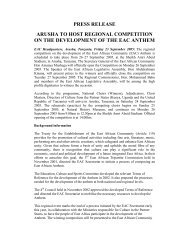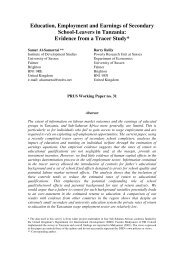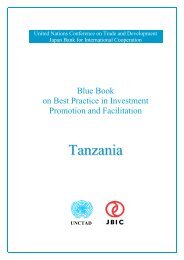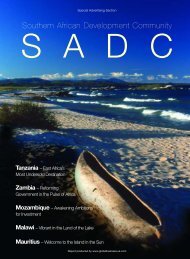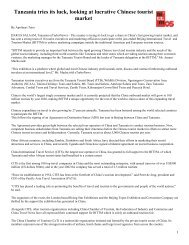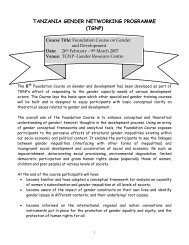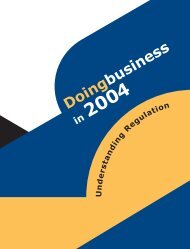Financial sector development - Sida
Financial sector development - Sida
Financial sector development - Sida
You also want an ePaper? Increase the reach of your titles
YUMPU automatically turns print PDFs into web optimized ePapers that Google loves.
work to prepare financial <strong>sector</strong> studies. One of the functions of <strong>Sida</strong>’s country<br />
economists will be to follow and provide information on the <strong>development</strong> of the financial<br />
<strong>sector</strong> in their respective countries.<br />
Policy dialogue. The efficiency of aid projects in the financial <strong>sector</strong> depends to a large<br />
extent on the commitment of the governments to pursue economic reforms. In connection<br />
with discussions and negotiations regarding adjustment support, balance of payment<br />
support and emergency assistance programmes <strong>Sida</strong> will be in a position to recommend<br />
policy changes which will facilitate the implementation of various financial <strong>sector</strong> projects.<br />
Technical assistance. Technical assistance projects will be the normal form of<br />
cooperation with recipient country partners - be it government or non-government<br />
institutions.<br />
<strong>Financial</strong> assistance. <strong>Financial</strong> assistance projects are related to the provision of capital<br />
and will take different forms depending on the conditions for the transfer of financial<br />
resources. Loans and guarantees can be provided directly by <strong>Sida</strong>. The availability and<br />
feasibility of these instruments will depend on the decisions taken by the Swedish<br />
government in relation to recommendations by the Concessionary Credit Study<br />
(”kreditutredningen”). Provision of risk capital will normally be made through other<br />
agencies such as Swedfund which may act as shareholders and execute owner functions<br />
in the financial institutions. <strong>Sida</strong> may provide refinancing of such risk capital on the<br />
condition that <strong>Sida</strong> will not take the full risk.<br />
Combination of assistance and synergies. Restructuring of state-owned financial<br />
institutions often include both transfer of know-how and transfer of funds. In the future<br />
there will also be increased possibilities to benefit from synergy effects. For example,<br />
financial <strong>sector</strong> <strong>development</strong> projects could be linked to the implementation of projects<br />
related to concessionary credits and soft loans (”U-krediter” and ”biståndskrediter”),<br />
restructuring of public enterprises and capitalisation of microfinance institutions.<br />
Initiatives for financial <strong>sector</strong> <strong>development</strong> assistance may come from government as well<br />
as from non-government parties. <strong>Financial</strong> <strong>sector</strong> projects funded by country<br />
programmes will be initiated by the recipient country while projects funded from other<br />
sources (e.g. funds for Enterprise Development, ”Näringslivsbistånd”) will be initiated by<br />
INEC following consultations with the embassies and the regional departments within<br />
<strong>Sida</strong>.<br />
10.8 Priorities and selection of projects<br />
In countries with less developed financial <strong>sector</strong>s. The country strategies will provide<br />
basic guidelines as to the types of cooperation projects. In a limited number of countries,<br />
e.g. countries in Eastern and Southern Africa, a proactive approach will be applied.<br />
Priority will be given to assistance geared at creating an “enabling environment”, i e<br />
support for the regulation, supervision and promotion of financial systems. Support for<br />
the creation and strengthening of financial supervisory agencies, capital market<br />
67



